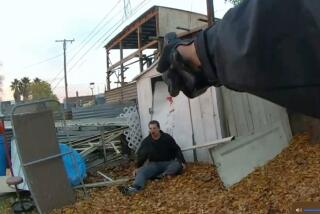Just a Gentle Tip for Prosecutors of Officer’s Killer
- Share via
Here’s a friendly suggestion to the district attorney’s office on what to decide about John George Brown--or Gordon Mink, as he renamed himself while hiding from police: Do him again.
Brown got a 4-3 state Supreme Court victory this week after 16 years on San Quentin’s death row for the 1980 murder of Garden Grove Police Officer Donald Reed. Brown, trying to avoid arrest on an outstanding warrant, opened fire at the crowded Crippled Creek Saloon on Garden Grove Boulevard. Besides killing Reed, he wounded two other officers and two bar patrons. Unless he is retried, Brown’s conviction remains reduced to second-degree murder.
The slim majority of the high state court found that Brown’s defense had been deprived of a key county lab report about his blood tests.
The court said it showed possible traces of the drug PCP in Brown’s system. The defense had contended at trial that a PCP flashback diminished Brown’s capacity to form the intent to commit first-degree murder. The lab report, the argument goes, could have added beef to that contention.
Perhaps. But it sounds more like baloney to me.
I can’t tell you that the state Supreme Court was wrong to overturn this verdict. The greatest scrutiny is needed in reviewing cases where the state wants to execute someone.
But no jury this side of the Atlantic Ocean is ever going to buy John George Brown’s defense. . . .
News reporters called him Mink to keep his last name untangled with that of the prosecutor, Deputy Dist. Atty. Bryan Brown. The John Brown trial was the first death penalty case I ever covered for this newspaper. We saw a lot of him long before his trial began. He filed a series of motions complaining about his living conditions at the Orange County Jail. And he preferred to represent himself.
During one hearing, defendant Brown snarled to Superior Court Judge Kenneth Lae, now deceased: “You probably didn’t even read my motion.”
A startled Lae retorted sternly to the long-bearded defendant: “I read every word.”
It was apparent during these pretrial hearings that Brown wasn’t the sharpest murder defendant around.
Prosecutor Brown asked him: “You are housed at the jail in Administrative Segregation, is that right?”
“No.”
Prosecutor Brown looked at his files again. “Are you sure you’re not in Administrative Segregation?”
“No, I’m not. I’m over in Ad Seg.”
If you’ve been watching those Ted Koppel prison documentaries on ABC’s “Nightline” the past week, you know Administration Segregation (Ad Seg, to inmates) is reserved for troublemakers within the jail.
Brown was an ex-con who had served time not only for a burglary conviction, but for injuring a police officer, running him down with his car to escape arrest in Florida.
Just a few thoughts on why Brown’s diminished capacity defense will fail again:
The test the defense says it didn’t get was only a screening to see if further testing was needed. There’s too much scientific evidence that a jury will not view the screening test as reliable.
Also, Orange County juries have almost never bought into a diminished capacity defense, let alone one this weak. Brown told his psychiatrist he had not been taking PCP at the time, or in the preceding weeks.
And also, too much evidence exists that Brown knew exactly what he was doing when he opened fire. (He told a girlfriend he would never let the police take him. Right before the shooting, he said, “Screw it, the pigs are here,” and tried to leave).
Some might argue that a retrial is a waste of tax money, because Brown likely will never be released anyway. I disagree.
Assistant Dist. Atty. John Conley said he would have to read the Supreme Court decision thoroughly before deciding on a retrial. But I think prosecutors are determined to seek another death verdict against Brown.
And every police officer in Orange County who ever had to make an arrest on an outstanding warrant--just like Donald Reed--will applaud that decision.
Lott o’ Confusion: It’s getting so you need a rule book to throw your money away on a Lotto ticket. The new system that began this week not only has gamblers confused, but some retailers too.
To clarify:
No longer will jackpot winners get their money spread out over 20 years--like $2 million a year for tonight’s $40-million jackpot.
The new system: You get your $40 million (as of tonight) all up front, or, you get it spread out over 26 years on a graduated scale. (The first year you would get only $1 million. You wouldn’t work up to the $2-million mark until your 26th year.
Take note: You have to tell the retailer what type of tickets you want: Cash value (the whole jackpot paid up front) or the 26-year-plan. This week my friends and I ran into numerous store clerks who had no idea what we were talking about. They gave us 26-year-plan tickets despite our requests for “cash value.” Don’t leave the store until the retailer gets it right.
Soaring the Waves: You share this daydream? We hop aboard our 65-foot sailboat and let the wind carry us to exotic stops. We come back, oh, maybe in a year or so.
That’s what happens today for the Alaska Eagle, the Orange Coast College’s 65-foot classroom-on-the-sea. It leaves Newport Harbor with 10 students who will help run it, plus a permanent crew of three, for an 18,000-mile transatlantic jaunt. The trip will be broken into 20 legs--Caribbean islands, the Azores, France and Norway among them--with a different set of 10 students on each leg. (Each pays from $120 to $130 a day.) The boat returns, through the Panama Canal, next March.
Wrap-Up: A chief complaint from families of murder victims is that during the trial, you almost never hear the victim’s name mentioned. The case, by definition, is mainly about the defendant, and that’s often hard for victims’ families to deal with.
At the Plaza of the Flags at the county Civic Center in Santa Ana, there’s a police memorial, now under renovation, for Orange County officers killed in the line of duty--41, including Reed. It’s a good reminder that trials are about victims too.
More to Read
Sign up for Essential California
The most important California stories and recommendations in your inbox every morning.
You may occasionally receive promotional content from the Los Angeles Times.













